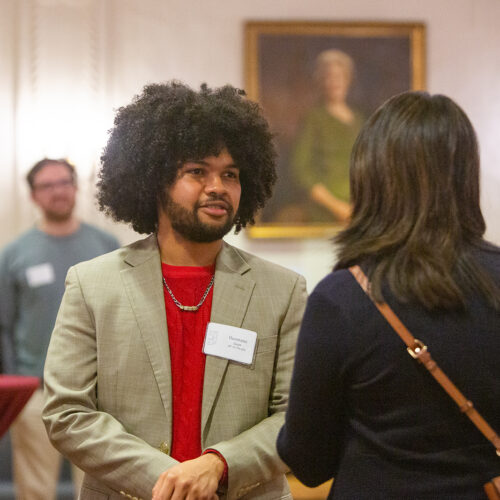We want to hear from you
What have you been up to since graduation? How are you involved in your community? We want to hear your story and how your WashU experience shaped your post-graduation life.
Want to get involved?
There are a variety of ways to get involved with La Comunidad to match your interests and availability. Tell us more about yourself by submitting the form below and a member of our team will contact you with more information.
Introducing La Comunidad
In 2022, a steering committee of WashU alumni who identify as Hispanic, Latinx, and Latin American co-founded La Comunidad. Meaning “the community” in Spanish, La Comunidad is intended as a cultural home for this highly diverse community of WashU alumni and an avenue through which network members can remain engaged with the university.
Although a national network, La Comunidad is launching with regional events in Chicago and St. Louis. The network holds an annual reception during WashU Reunion.
A conversation with Mario Treto, AB ’07
Stay in the know
Update your alumni profile to stay connected.
Upcoming Events
STEERING COMMITTEE
Isabel Acevedo, BS ’06
Jorge Castillo, AB ’06
Julia Macias, PhD ’20
Jocelyn Meraz, AB ’18
Carol Pazos, AB ’20
Andrea Straccia, BSBA ’06, MA ’09
A note on terminology
In order to be in alignment with our values and reflect the language currently used on campus at WashU, you will observe La Comunidad using the terms Latinx and Latine. Latinx and Latine push beyond gender binaries and acknowledge the intersecting identities of our incredibly diverse community. For us, these are not exclusionary terms; rather, they open the door to all the ways people want to be identified. Some within our community may use individualized language that reflects their own experience, such as Latino, Latina, Hispanic, Afro-Latinx or specific national/regional identities (e.g., Costa Rican, Brazilian, Puerto Rican, Chicano/a). We commit to re-evaluating our approach as language continues to evolve and as we receive feedback from our community.
